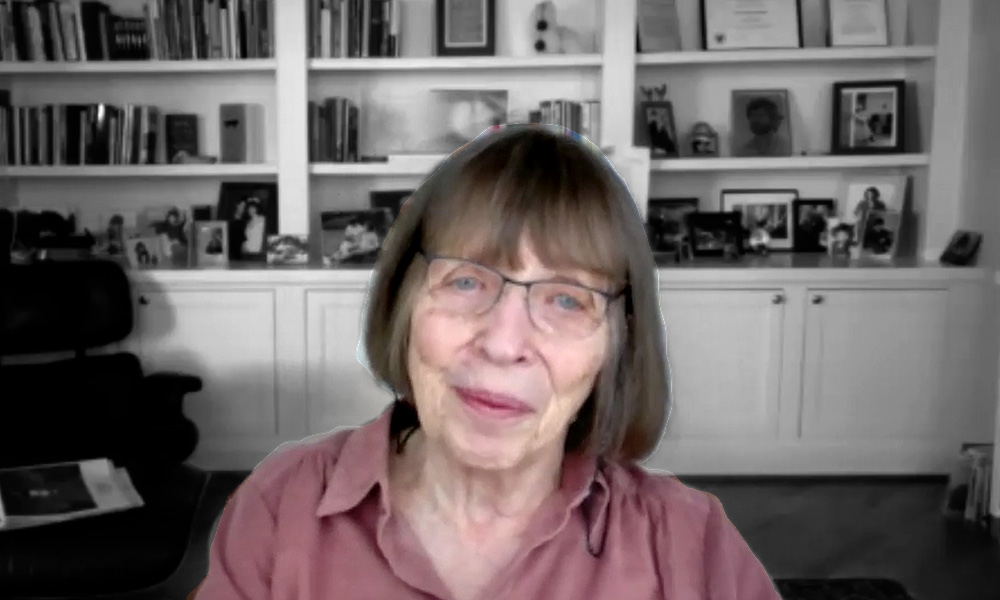In February 2022, Moment interviewed Linda Pastan about her poem, “I Hold My Breath,” published in our November/December 2020 issue. To mark her passing, we’re publishing the interview now.
Before reading the interview, we invite you to listen to this recording of Linda reading “I Hold My Breath” from 2022.
How long have you been writing poems, and what’s your process?
Well, I started writing poems when I was about 12, and in May I’m going to be 90, so that’s a very long time. I didn’t think of myself as what one might really call a poet until I was in my early 30s and had my last child. I got married when I was in college and was a typical ’50s housewife, very frustrated because I knew I ought to be writing. And then I started after my third child was born and worked every day from then on, every morning, I tried to work, but the process is very mysterious.
Anyhow, I just write single poems and then after a few years when I think I have enough, I put them together in a book. People seem to think that with each poem I’m getting ready for a specific book, which isn’t true. I just write an individual poems and after four or five years, I spread them all on the floor and try to see if there’s any theme to them, to what I was doing, and then put them together in some way.
I’ve spent the past two years confined in my apartment, since at my age if you get COVID, it’s not good. And so I’ve put together a book of new poems that are selections from the books I’ve written since Carnival Evening. And that’s a lot of work because I care which poems face each other., that kind of stuff. I have to count lines, and it’s a long process. Plus when I choose a few poems, it’s as if I’m consigning the others to oblivion, because when I give readings, I carry one book with me. I don’t take all the books.
Where are you geographically?
I’m in Chevy Chase, Maryland, right on the border of Washington. We lived in Potomac on six acres of woods for 50 years. And then two years ago, the driving got too much and taking care of all those woods got too much. And so we moved to a very beautiful apartment overlooking trees and I had to get rid of a lot of books. That was the hardest thing.
We discovered Potomac before the rich discovered it, so we could buy six acres, and then it got pretty built up. So driving down River Road just to our woods, you passed all these McMansions. It just wasn’t pleasant anymore. But I’m happy in Chevy Chase, I can walk to doctors and dentists and to my children and grandchildren.
What was it like to be connected to one piece of land for 50 years?
Well, it was lonely. It was very isolating. I’m an only child. I like to be surrounded by people, but because of its loneliness and isolation, I really worked. And I wouldn’t have written 15 books if I had lived here, because this is a very social place. I would’ve found reasons not to be sitting at my desk.
What can you share with us about “I Hold My Breath”?
It came about in a way that was very different from the way I usually write. I usually get an idea or an image and put it down and then sort of free associate down the page. In his wonderful essay, “Writing the Australian Crawl,” William Stafford tells us that you let a poem take you where it wants to, and then you learn what you didn’t know you knew.
But I have lots and lots of failed poems, things that I’ve worked on that I really liked. Before the computer, I had a drawer that I just would put these all in, but now I have a file called, optimistically, Poems in Progress, and when I’m stuck and don’t know what I want to write about, I’ll look in that file to see if there’s anything that needs to be worked on. For “I Hold My Breath,” each stanza was taken from a different failed poem.
There was one thing in each failed poem that I liked, and I made a stanza out of it, and then I manipulated it all and changed it around and tried to make it one cohesive poem. That’s why I come back to the weather, which was the first stanza, at the end of the last stanza—so that there was a sort of circle. And though I believe it was Archibald Macleish who said a poem should not mean but be, I will say that some of the things that this poem sort of is about is denial, superstition, and mostly how the imagination can make something real that isn’t real. And that’s more or less all I can say about this poem, which is more than I usually say about poems of mine.


I love her statement that she free associates from an image or word, and then somehow at the end she learns what she didn’t know she knew. That’s the joy! I’m privileged to have known Linda and studied with her…